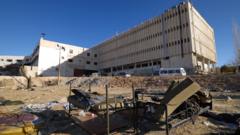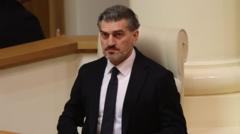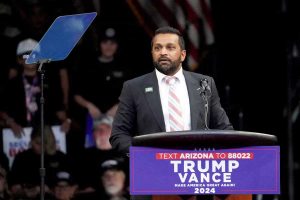As 45% of Pestera's residents seek better opportunities abroad, ultranationalist Calin Georgescu has captured local support by addressing long-standing grievances. His initial electoral success was thwarted by a constitutional ruling to annul the presidential elections, reflecting a growing divide between rural sentiments and established political parties in Romania.
Ultranationalist Candidate Captures Romanian Village Amid Political Turmoil

Ultranationalist Candidate Captures Romanian Village Amid Political Turmoil
In the village of Pestera, discontent drives support for Calin Georgescu, an ultranationalist candidate whose presidential campaign gains momentum despite election setbacks.
In the humble Romanian village of Pestera, a stark reality unfolds as nearly 45% of its inhabitants have departed for opportunities overseas. The local economy, primarily based on farming, struggles alongside a small German-owned convenience store. The socio-economic shift has left many families longing for better prospects, with most having at least one working parent abroad. The village's mayor noted that prior to Romania's presidential election cancellation, residents were “waiting for the messiah” — an ultranationalist candidate named Calin Georgescu, who promised revitalization through jobs and respect for their overlooked struggles.
In the initial voting rounds of the presidential race, Mr. Georgescu garnered a remarkable 46% of the vote, reflective of discontent in Pestera, which exhibits poor infrastructure and a stark distance from Romania’s affluent capital, Bucharest. His rise embodies a growing sentiment among voters who feel marginalized by political parties perceived as corrupt and excessively influenced by the European Union and foreign economic interests. The rural areas represent a passionate response to these conditions, where Georgescu, without an official party affiliation, has embodied nationalist ideals, attracting voters seeking change.
The political landscape shifted dramatically when Romania’s constitutional court annulled the results of the recent election. They cited the necessity of a thorough review to uphold the integrity of the electoral process. The consequence of this ruling was the cancellation of the runoff election, which was set between Georgescu and a centrist contender, Elena Lasconi.
This situation illustrates a larger narrative within Romanian politics, where nationalist sentiments are reshaping the discourse, particularly in regions that feel abandoned by conventional political frameworks. As economic despair lingers, and foreign influences loom large, the struggle for identity and representation in Romania could redefine its political future in the coming years. The path ahead remains uncertain, but the fervor evident in places like Pestera signals a populace ready to advocate for its own interests.





















